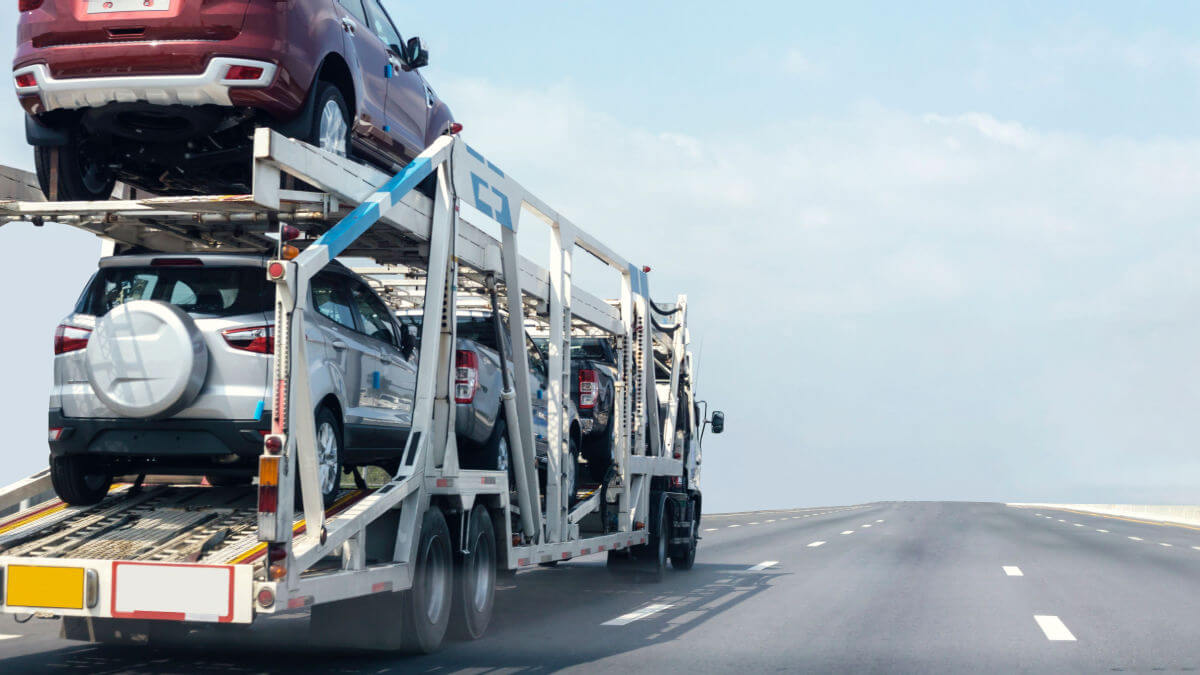Moving to South Africa from the UK: Complete guide
Everything you need to know about moving to South Africa from the UK. Read about visas, popular expat destinations, healthcare and more.

Thinking of buying a car from South Africa? Or perhaps you’ve already bought one while living overseas and need to get it shipped over to the UK.
South Africa is a great place to source a classic car, perhaps even at a bargain price. But how easy is it to import cars into the UK from SA?
In this guide, we’ll run through everything you need to know about how to import cars from South Africa to the UK. This includes helpful info on the procedures, paperwork and costs involved. Plus, how to register your vehicle with the DVLA once it arrives in the UK.
Need a secure way to pay for the car and costs overseas? Check out the Wise account – a universal account for sending, spending, and receiving money with transparent, low fees and multiple layers of security.
Learn more about the Wise account
Firstly, let’s take a look at why you might want to import a car from South Africa in the first place, rather than buying it in the UK. We’ll also run through any potential pitfalls you need to look out for.
Pros:
Cons:
Yes, you can import a car from South Africa, but there are some rules you should be aware of before starting the process.
Firstly, you’ll need to make sure the vehicle you’re importing meets the UK’s environmental and safety regulations.
For any vehicle not registered in the EU, you’ll need to apply to the DVLA for Individual Vehicle Approval (IVA).¹
This can be a little tricky for vehicles sourced from South Africa. For vehicles under 10 years old, you may not be able to get the necessary testing carried out, unless the following apply:²
These rules are designed to protect the UK’s right-hand drive market from cheaper imports (South African vehicles are also right-hand drive).
You’ll also need to pay full import duties and taxes unless you meet the requirements above.²
If you meet the criteria, you should be able to get IVA testing and approval.
For newer cars, the IVA test will still be required, and you may need to pay for modifications to be made so that the car meets UK regulations. We’ll touch on this more later.
Here’s how to import a car from South Africa to the UK:
Now, let’s delve a bit deeper into these different steps, as it can be a slightly complicated process.
The first step is to find a car you want to buy. If you live in South Africa or can take a trip there, you’ll be able to visit dealerships, car auctions or private sellers in person.
If you can, it’s recommended to physically inspect the car in person, and perhaps take a test drive too. If you’re based in the UK and can’t get over to South Africa, see if you can find someone to check out the car in person before you commit to the purchase.
You’ll also need to be very careful of scams if you’re buying a car in another country - or making any large purchase, for that matter. Do your homework on the seller, to make sure they’re legitimate.
You should also make sure to read the small print and uncover any hidden fees before sending over funds.
And when the time comes to make a payment, make sure to use a secure service to transfer your money, like Wise. You can send large sums securely with Wise, with no hidden fees and fair, mid-market exchange rates for converting your GBP to ZAR. It could be much cheaper than using your bank*.
Please see the Terms of Use for your region or visit Wise fees & pricing for the most up-to-date information on pricing and fees.
| 💡Read more: What bank details are needed for an international bank transfer from the UK? |
|---|
Some of the most popular South African imports you’ll see on UK roads include:³
With your dream car purchased, it’s time to think about shipping.
While cost is always going to be an important consideration, pause before just going with the cheapest option. You might save on shipping costs, but could end up with a damaged car and inadequate insurance to cover any repairs.
It’s more important for your car to arrive in the UK safely, quickly and with all the paperwork in order. So, look for car shipping agencies which:
You might also want to look for firms which offer tracking services, or tools to simplify the UK customs clearance process.
There are a few different ways you can ship your newly purchased car from South Africa to the UK. These are:⁴
Roll on/roll-off. This is where cars are simply driven into a ship’s cargo area, along with other vehicles. It’s one of the cheapest options, but only suitable for working/driveable vehicles. There may also be a risk of damage.
Shared container service. This is where your car is shipped with other vehicles inside a shipping container. The costs are shared between everyone using the container. It can be more secure, and is a good option for non-functioning cars, but it can take longer. This is because you’ll need to wait until the container is filled before it can be loaded and shipped.
Full container load. With this method, you’ll get the shipping container all to yourself. It’s the most expensive option, as you’ll be responsible for all charges. However, it can be quicker as the container can be shipped at any time.
You’ll also need to decide whether to use a UK or South Africa-based shipping company. It could be worth choosing a UK-based agent, as you’ll both speak the same language. This minimises the risk of miscommunication, or you not understanding what is and isn’t included in the price you’re quoted.
Before your car sets off on its journey to the UK, it’s recommended to take some photos. Or if you’re not there in person, arrange for someone else to take them). You should also take photos once your car arrives in the country.
Focus on key points of contact, anywhere the car will be secured during transit. For example, side skirts, axles and wheels. Armed with this photographic evidence, you’ll be able to identify and claim for any damage caused during the journey.
You should also research insurance options, both for the journey and for when the car arrives in the UK.
Now we come to the important part - the paperwork. You’ll need certain documents to make sure your South African import clears customs in the UK. It’ll also be needed for registering the car with the DVLA.
Here’s what you should have ready:⁵
| Document | Where to get it |
|---|---|
| Import declaration | The Customs Handling of Import and Export Freight (CHIEF) system - although your shipping agency can handle this for you |
| Proof of ownership - such as the invoice or bill of sale for your vehicle (needed for the import declaration) | The seller/dealer |
| Shipping note and bill of lading (BOL) | Your shipping agency |
| Vehicle registration certificate or the vin/chassis number | The seller/dealer |
| Proof of Individual Vehicle Approval (IVA) | DVLA |
You’re also likely to need a form of photo ID, such as your passport.
| 💡Read more: What is cash against documents? |
|---|
Once your vehicle has cleared UK customs, you’ll have two important things to get sorted.
Firstly, you need to tell HMRC within 14 days of the car arriving.⁵ They’ll tell you if any VAT or duties are due, and you’ll need to pay them if so.
Only once you’ve done this, can you move onto the second task - registering the car with the DVLA.
This involves filling in some forms and providing supporting documents. DVLA may also ask to inspect the vehicle. Once you’ve submitted your application, it can take up to 6 weeks to receive your V5C registration certificate.⁶
Make sure you have these documents ready in order to register your South African import with the DVLA:⁶
The last step is to get your South African car ready and road legal before you can drive it in the UK. This includes getting a UK number plate, insurance and paying Vehicle Excise Duty (VED).
For certain South African cars, you might need to make other adjustments. If your chosen vehicle doesn’t pass the Individual Vehicle Approval (IVA) process, you’ll need to pay for modifications to be made. For example, you might need the speedometer converting to MPH and rear fog lights installed.²
Importing a car from overseas will always come with costs. So even if you find a bargain in South Africa, you’ll need to budget for things like shipping agency fees and import duties.
The costs can vary depending on the agency you use and other factors. But here’s a rough guide to some of the costs you can expect:
| Type | Cost |
|---|---|
| Shipping agency fees | Around £2,000⁷ |
| Import duty (if applicable) | 10%⁸ |
| VAT (if applicable) | 20%⁸ |
| DVSA inspection fee for Individual Vehicle Approval (IVA) | £199 to £294⁹ |
Use this UK import duty calculator to add up the customs charges.
If you’re paying any of these fees in ZAR, pause before using your bank. Take a look at the Wise account instead, as it could save you money.
You can send money worldwide with Wise for low fees and fair exchange rates. It’s convenient, secure and speedy, even for large transfers. So, you can get your new car on its way to the UK quickly.
Please see the Terms of Use for your region or visit Wise fees & pricing for the most up-to-date information on pricing and fees.
After reading this guide, you should have a better idea of the process of importing a car from South Africa to the UK.
This includes the documents you’ll need, what order to do things in, and how much it costs. You’ll be ready to hit the road in no time.
Sources used:
Sources last checked on date: 08-May-2023
*Please see terms of use and product availability for your region or visit Wise fees and pricing for the most up to date pricing and fee information.
This publication is provided for general information purposes and does not constitute legal, tax or other professional advice from Wise Payments Limited or its subsidiaries and its affiliates, and it is not intended as a substitute for obtaining advice from a financial advisor or any other professional.
We make no representations, warranties or guarantees, whether expressed or implied, that the content in the publication is accurate, complete or up to date.

Everything you need to know about moving to South Africa from the UK. Read about visas, popular expat destinations, healthcare and more.

Discover everything you need to know about inheritance tax in South Africa. Our comprehensive guide covers the rates, who pays, how to calculate, and much more.

The complete guide to buying property in South Africa as a Brit, including the latest South Africa property prices.

The costs in South Africa depend on the region and the city you’re moving to from the UK. Learn about average living prices when moving to South Africa.

South Africa is the second largest economy on the continent, and responsible for drawing in some 24% of all of Africa’s GDP. Despite challenges, the economy...